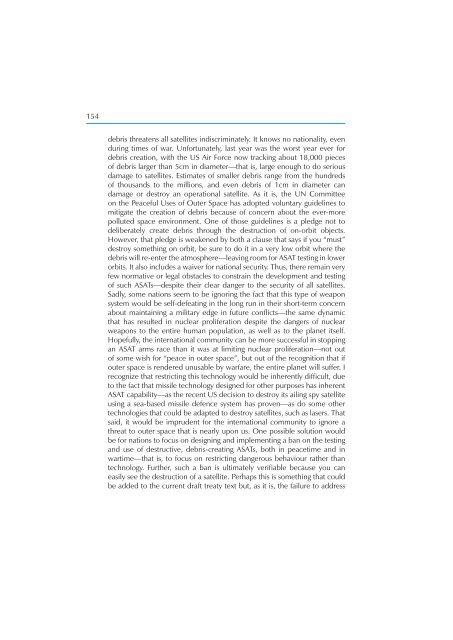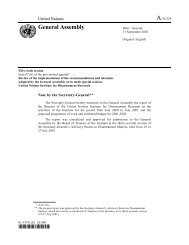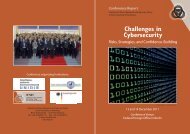Security in Space The Next Generation - UNIDIR
Security in Space The Next Generation - UNIDIR
Security in Space The Next Generation - UNIDIR
You also want an ePaper? Increase the reach of your titles
YUMPU automatically turns print PDFs into web optimized ePapers that Google loves.
154<br />
debris threatens all satellites <strong>in</strong>discrim<strong>in</strong>ately. It knows no nationality, even<br />
dur<strong>in</strong>g times of war. Unfortunately, last year was the worst year ever for<br />
debris creation, with the US Air Force now track<strong>in</strong>g about 18,000 pieces<br />
of debris larger than 5cm <strong>in</strong> diameter—that is, large enough to do serious<br />
damage to satellites. Estimates of smaller debris range from the hundreds<br />
of thousands to the millions, and even debris of 1cm <strong>in</strong> diameter can<br />
damage or destroy an operational satellite. As it is, the UN Committee<br />
on the Peaceful Uses of Outer <strong>Space</strong> has adopted voluntary guidel<strong>in</strong>es to<br />
mitigate the creation of debris because of concern about the ever-more<br />
polluted space environment. One of those guidel<strong>in</strong>es is a pledge not to<br />
deliberately create debris through the destruction of on-orbit objects.<br />
However, that pledge is weakened by both a clause that says if you “must”<br />
destroy someth<strong>in</strong>g on orbit, be sure to do it <strong>in</strong> a very low orbit where the<br />
debris will re-enter the atmosphere—leav<strong>in</strong>g room for ASAT test<strong>in</strong>g <strong>in</strong> lower<br />
orbits. It also <strong>in</strong>cludes a waiver for national security. Thus, there rema<strong>in</strong> very<br />
few normative or legal obstacles to constra<strong>in</strong> the development and test<strong>in</strong>g<br />
of such ASATs—despite their clear danger to the security of all satellites.<br />
Sadly, some nations seem to be ignor<strong>in</strong>g the fact that this type of weapon<br />
system would be self-defeat<strong>in</strong>g <strong>in</strong> the long run <strong>in</strong> their short-term concern<br />
about ma<strong>in</strong>ta<strong>in</strong><strong>in</strong>g a military edge <strong>in</strong> future confl icts—the same dynamic<br />
that has resulted <strong>in</strong> nuclear proliferation despite the dangers of nuclear<br />
weapons to the entire human population, as well as to the planet itself.<br />
Hopefully, the <strong>in</strong>ternational community can be more successful <strong>in</strong> stopp<strong>in</strong>g<br />
an ASAT arms race than it was at limit<strong>in</strong>g nuclear proliferation—not out<br />
of some wish for “peace <strong>in</strong> outer space”, but out of the recognition that if<br />
outer space is rendered unusable by warfare, the entire planet will suffer. I<br />
recognize that restrict<strong>in</strong>g this technology would be <strong>in</strong>herently diffi cult, due<br />
to the fact that missile technology designed for other purposes has <strong>in</strong>herent<br />
ASAT capability—as the recent US decision to destroy its ail<strong>in</strong>g spy satellite<br />
us<strong>in</strong>g a sea-based missile defence system has proven—as do some other<br />
technologies that could be adapted to destroy satellites, such as lasers. That<br />
said, it would be imprudent for the <strong>in</strong>ternational community to ignore a<br />
threat to outer space that is nearly upon us. One possible solution would<br />
be for nations to focus on design<strong>in</strong>g and implement<strong>in</strong>g a ban on the test<strong>in</strong>g<br />
and use of destructive, debris-creat<strong>in</strong>g ASATs, both <strong>in</strong> peacetime and <strong>in</strong><br />
wartime—that is, to focus on restrict<strong>in</strong>g dangerous behaviour rather than<br />
technology. Further, such a ban is ultimately verifi able because you can<br />
easily see the destruction of a satellite. Perhaps this is someth<strong>in</strong>g that could<br />
be added to the current draft treaty text but, as it is, the failure to address








